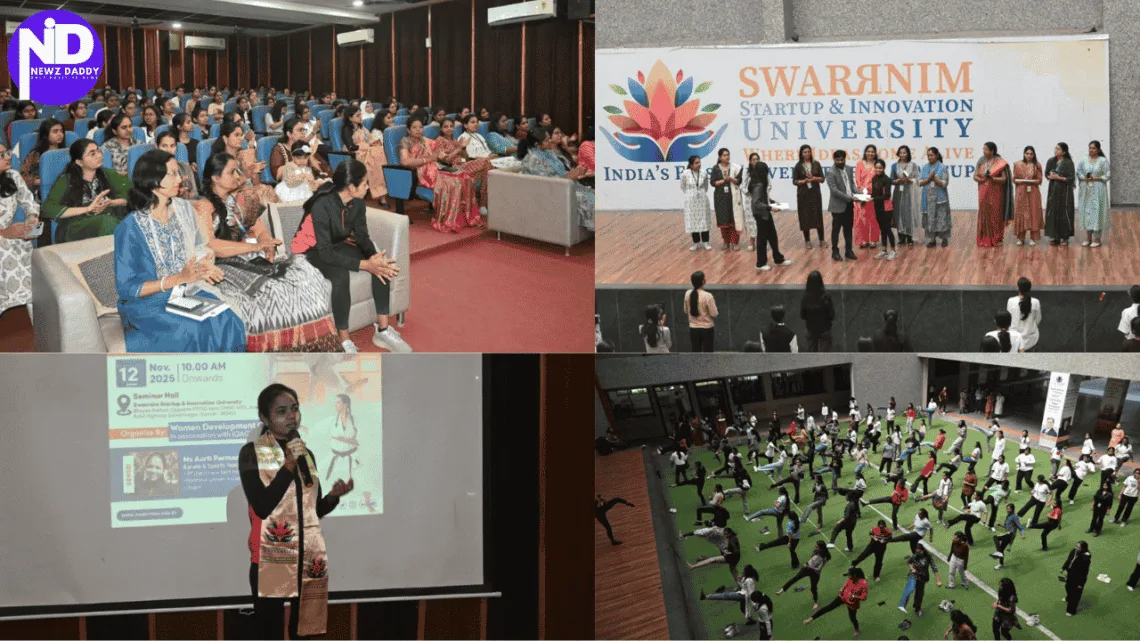Women’s Safety Training at University Sparks Real Change
Newz Daddy Educational Updates
The Women Development Cell (WDC) of Swarrnim Startup & Innovation University, in partnership with its Internal Quality Assurance Cell (IQAC), held a one-day training programme at their Seminar Hall on the Bhoyan Rathod Campus in Adalaj, Gandhinagar. Around 120 students and 41 faculty members attended. The event comprised three expert-led sessions: “Swaraksha”, “Ancient Wisdom for Modern You”, and “Menstrual Health and Hygiene”. The speakers were Ms Aarti Parmar, Dr Prajna G, and Dr Ankita Chavan, respectively.
In the first session, “Swaraksha”, Ms Parmar led a hands-on self-defence workshop, teaching participants practical techniques to protect themselves in risky situations. Self-defence training for women is more than physical moves – it gives them confidence and mental strength. Studies show that such training helps women recognise danger, set boundaries, and respond effectively to threats. After lunch, Dr Prajna G spoke about drawing from ancient Indian wisdom, like meditation, yoga, and traditional knowledge, to improve modern life. Ancient practices such as dhyāna (meditation) are increasingly recognised for their benefits: they support mental clarity, reduce stress, and strengthen self-awareness.
The final session was led by Dr Ankita Chavan, who addressed menstrual health, hygiene, and the social taboos that still surround periods. This open conversation helped students understand how normal menstruation is, and how critical it is to talk about it without shame. In India, many girls lack correct information: it is estimated that a large number are unaware of menstruation before their first period, and some use unsafe materials to manage it. Poor menstrual hygiene can cause infections and harm dignity; according to health advocates, education and safe products can dramatically improve outcomes. By bringing these three themes, safety, holistic well-being, and menstrual health, into one day, the university created a space for empowerment. The training helped women feel safer, more informed, and more confident in speaking about deeply personal issues.
Self-defence workshops like “Swaraksha” are not just about learning moves. They build empowerment. In India, with persistent gender-based violence, self-defence training is often part of government and NGO efforts to strengthen women’s personal safety. Research shows that self-defence education can change how women respond to danger, enabling them to make confident decisions and reduce dependency on others.
Talking about ancient wisdom may sound spiritual, but it has real benefits. Practices rooted in Indian traditions — such as meditation, yoga and Ayurveda- are being adopted globally because they improve mental health, help with stress, and support holistic health. These teachings help link the past with the present, giving young women tools to lead balanced lives amidst modern pressures.
Discussing menstrual health openly is vital. In India, despite progress, many girls and women still face myths, stigma, and a lack of facilities. According to experts, proper education can prevent infections, reduce school dropouts, and promote dignity. Organisations like Tata Trusts highlight that menstrual health should be treated as a key part of overall health, just like other vital signs. By educating both young women and their communities, stigma can be reduced, and more informed choices can be made.
This combined training day helps students and faculty think differently. First, self-defence reduces fear and builds self-reliance. Second, learning from ancient wisdom gives them habits to improve mental well-being. Third, discussing menstrual health brings transparency and normalises a natural process. Together, these sessions contribute to a culture of respect, safety, and well-being.
Moreover, by training faculty too, the university ensures that awareness spreads beyond students. Teachers who understand these issues can better support young women, perhaps by bringing similar workshops into classrooms or mentoring sessions. Workshops like this one by Swarrnim University align with national priorities. India has seen growing support for self-defence training as a way to improve women’s safety, and initiatives by the Ministry of Skill Development and Entrepreneurship reflect this
On menstrual health, social movements such as the Period Chart Campaign and “Happy to Bleed” have tried to break taboos and enable open conversations in society. Supporting education and product access remains essential: many girls still do not receive accurate information before their first period, and some use unsafe materials due to a lack of affordable products. Meanwhile, sustainable menstrual care is another growing area: eco-friendly options, such as reusable cloth pads and menstrual cups, are being promoted, helping women and reducing environmental waste.
Swarrnim Startup & Innovation University’s training day is a strong example of how academic institutions can contribute to real social change. It is not just a one-off event; such programmes can ripple outwards: informed students may start peer groups, awareness campaigns or even social enterprises. Their voices can shape how society discusses safety, tradition, and health. When students who learn self-defence also learn to meditate, and also feel free to speak about their periods, it builds a generation that is resilient, thoughtful, and unafraid to challenge stigma. That is a powerful message.
Must Read:
Fresh Start With The Orientation Programme At Swarrnim University
Swarrnim Startup & Innovation University Brings Forensic Medicine to Life






